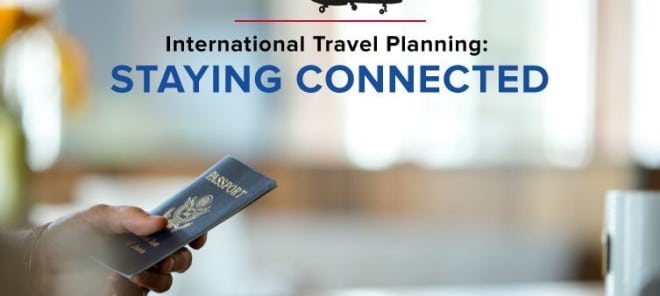Travel abroad is exciting, but there’s a lot to take on before you take off. Not sure where to start? Our upcoming international travel planning series can help you map out every detail. Let’s start with one of the most important considerations: Communication
Some tips to help you stay connected while abroad:
Phoning home
International roaming charges can be expensive, so you may want to rent or buy a mobile phone from an international SIM card company, such as Cellular Abroad, which allows you to keep calling both locally and at home for low rates.
Local calls
If you need to make local calls while abroad, consider buying a SIM card. What you need to know:
You can swap your smart phone’s existing SIM card for one from a local operator to receive a local number.
You must unlock your phone’s SIM card slot to use a foreign SIM card. All cell phones can be unlocked but some come locked as default. Contact your carrier to have your phone unlocked.
Inexpensive local pay-as-you-go phones
If unlocking your phone’s SIM card with your carrier is not possible, you can also rent or buy an inexpensive pay-as-you-go phone in many countries. Simply add money as you need it at a local newsstand, supermarket or phone store.
Pre-paid phone cards
Another alternative is to buy a phone card, but before doing so, take your calling patterns into consideration. Will you be making lengthy calls? If so, a card that offers low per-minute rates may be best.
Other things to consider when buying:
1. Avoid cards with post-call and maintenance fees
2. Look for a phone card that displays rate information
3. Check for cards with a toll-free customer service number in the event of a problem
4. Check the card’s expiration date
5. Before you buy, make sure the covering over the PIN number hasn’t been removed
Hit the hot spots – Wi-Fi style
Depending on the city you’re visiting, there are different ways of utilizing Wi-Fi hot spots. Either find it for free at restaurants, etc., or buy an unlimited pass for city-wide Wi-Fi.
Not into hunting down Wi-Fi? Consider a paid plan. Companies like Boingo offers unlimited Wi-Fi access to more than 1 million spots worldwide.
Just be careful connecting to a Wi-Fi network to avoid a security hack:
Turn off your wireless connection when not in use
Create long, difficult passwords
Confirm that the network is legitimate by asking a manager
Apps for chatting
These apps can make international calling and messaging convenient and affordable:
Google Voice is a telecom service that allows Gmail users to make international calls at low rates, as well as send free text messages, customize their voicemail, host conference calls and read voicemail text transcript. Calling rates vary by country. With nothing to download or install, the service works with several devices, including mobile phones, desk phones, work phones and VoIP lines.
Skype is a popular application for web-based calling on computers and phones, but the app also offers very low rates for international calls to mobile phones and land lines as well. Both monthly subscriptions and pay-as-you-go options are available.
Viber is a mobile app available over Wi-Fi and 3G that lets users send free texts, photos and video messages, as well as free calls to other Viber users on any network, in any country. The app also features ViberOut, a low-cost option for calling non-Viber users.
WhatsApp is a mobile messaging app that lets users send and receive text, video and audio messages free. Messages can be sent internationally at no charge to other WhatsApp users.
WeChat is a free app with such features as voice and video calls, voice chat, group chats and photo sharing. All features are free and have no region restrictions. All you need is an internet connection.
Live like a local with language translator apps
If you don’t speak the language, translator apps can be helpful on your trip.
Hold the mail
For an extended trip, you can put your mail on hold at your local post office for 3-30 days. Requests can be made online, by phone or in person up to 30 days before you leave.
Circulate copies of your itinerary
In the event you can’t reach family or friends back home, give an emergency contact your complete itinerary including:
1. Address of the location you’ll be staying
2. Phone number of your hotel or lodging
3. Airline flight number, time and details of departure and return
4. Now that your communication plans are on track, check out the rest of the articles in our international travel planning series to help you prepare for other phases of your adventure.
